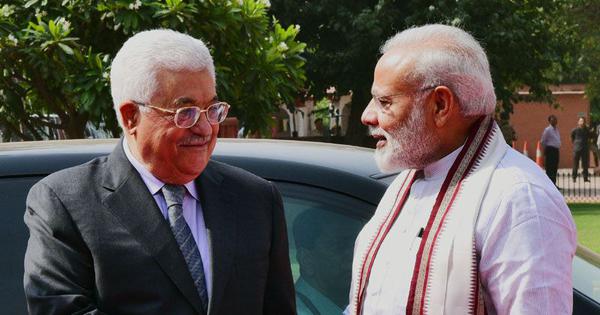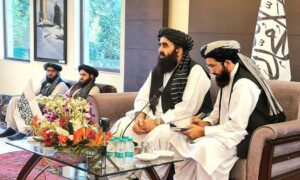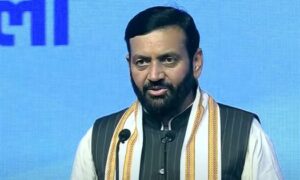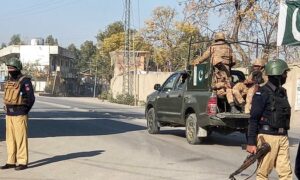
The police in Goa on Wednesday detained several persons who were participating in a peaceful march in Panaji to show solidarity with Palestinians amid Israel’s war on Gaza.
The police cited the absence of permissions as the reason for detaining the protesters, according to local media.
This came two weeks after the police in Mumbai stopped a 77-year-old man for distributing leaflets that urged people to “rise above hate and war”.
VK Tripathi, a retired physics professor from Delhi and a peace activist, was told by the police that he could not distribute pamphlets on “sensitive issues” without permission, Mumbai Mirror reported.
“I hold both [Palestinian militant group] Hamas and Israel equally responsible for the violence,” Tripathi told the newspaper. “My concern is how humanity is suffering on both sides.”
He added that neither his words nor the pamphlets “singled out any religion or group” and he was shocked to have been stopped from distributing them.
These incidents came around the second anniversary on Wednesday of the beginning of Israel’s war on Gaza.
Israel’s military offensive in Gaza began in October 2023 after Hamas killed 1,200 persons during an incursion into southern Israel and took hostages. Israel has been carrying out unprecedented air and ground strikes on besieged Palestinian territory since then, leaving more than 67,000 persons dead.
In August, the United Nations formally declared a famine in northern Gaza. In September, a UN inquiry committee concluded that Israel has committed genocide.
On Friday, the first phase of a fragile ceasefire mediated by United States President Donald Trump and a group of Muslim-majority countries took effect. Such truces have collapsed several times.
It is against the backdrop of this bloodshed that protesters in India and around the world are reiterating demands for the conflict to end and a Palestinian state to be created.
The blocking of pro-Palestine protests in India mirrors the trend in the United States.
The Donald Trump administration has increased scrutiny, revoked visas and attempted to deport foreign students and academics following pro-Palestine protests on college campuses. In several cases, mere participation in demonstrations demanding Palestinian statehood or humanitarian assistance in Gaza has been wrongly conflated as support for Hamas.
When the Indian police in late 2023 barred the first wave of demonstrations and messages expressing solidarity with Palestine on grounds of maintaining communal harmony and law and order, Scroll had explained how there is no legal basis for the crackdown.
In fact, the protesters’ demands are in line with Indian foreign policy.
New Delhi’s longstanding principled position has been to support the two-state solution for establishing a sovereign, viable and independent state of Palestine within recognised and mutually agreed borders, living side by side with Israel in peace.
When Palestine declared statehood in 1988, India was among the first countries to recognise it. On the other hand, while India recognised Israel in 1950, it did not establish full diplomatic relations until 1992.
The Indian government even conferred Palestinian leader Yasser Arafat with the Jawaharlal Nehru Award for International Understanding in 1988.
This diplomatic positioning was rooted in New Delhi’s idealist and anti-colonial outlook of the time.
A discernible shift
But the times have changed. As a former Indian ambassador who was posted in West Asia told me last year, over the last few years, there has been a discernible shift towards Israel. “We’ve probably been less even-handed than we used to be, on this [Israel-Palestine] issue,” the diplomat said.
While New Delhi supports UN resolutions against Israeli settlements in Palestine in line with the two-state solution, it also abstains from voting on rather uncontroversial demands to end Tel Aviv’s “unlawful presence” in the Palestinian territories.
What has led to India’s fading support for the Palestinian cause, if not a complete abandonment? Or what is described as dropping idealism for pragmatism.
The shift has been driven by the confluence of mainly two factors.
The economic and strategic utility of Tel Aviv has grown significantly for New Delhi in the past decade.
For example, India and Israel, besides the United Arab Emirates and the US, are part of the new I2U2 strategic grouping. Simultaneously, the India-Middle East-Europe Economic Corridor, a planned infrastructure project launched less than a month before the Gaza conflict began, aims at boosting connectivity between the three regions and passes through Israel.
Israel is also becoming a pasture for the global expansion of Indian companies, in lockstep with Indian diplomacy.
The Adani Group acquired Israel’s strategically-located Haifa port in 2022.
The growing partnership is playing out in the defence domain too. The conglomerate has also formed a joint venture with an Israeli firm to manufacture military drones.
In the past decade, India has imported military hardware worth nearly $3 billion from Israel including combat and surveillance drones, radars and missiles.
The second aspect driving the shift is the solidarity of the BJP’s Hindutva ideology with the Israeli state’s Zionism. While the two ideologies are not alike, they find convergence in their anti-Muslim politics.
What this shift has resulted in is the Indian state acting against ordinary citizens merely asking for an end to the conflict and humanitarian aid to Gazans.
Read Scroll’s coverage of Israel’s war on Gaza here.
Here is a summary of last week’s top stories.
Attacker goes scot-free? The lawyer who threw a shoe at Chief Justice BR Gavai inside the Supreme Court on Monday was released from police custody after the court’s registrar general declined to press charges against him.
The registrar general also directed the police to return the shoes and documents that had been seized from the lawyer, Rakesh Kishore.
A handwritten note was recovered from Kishore that read: “My message is for all Sanatanis…India will not tolerate disrespect to Sanatan Dharma”. Sanatan Dharma is a term some use as a synonym for Hinduism.
Kishore appeared to have been angered by a statement made by the chief justice on September 16 while hearing a plea seeking the restoration of a beheaded idol of Hindu deity Vishnu at Madhya Pradesh’s Khajuraho.
While dismissing the plea, Gavai had said: “This is purely publicity interest litigation. Go and ask the deity himself to do something. If you are saying that you are a strong devotee of Lord Vishnu, then you pray and do some meditation.”
The remarks had sparked criticism on social media.
On Monday, Kishore, in an apparent reference to Gavai’s statement, had reportedly shouted: “India will not tolerate disrespect towards Sanatan Dharma.”
The Bar Council of India suspended Kishore’s licence to practice and initiated disciplinary proceedings against him.
Anand Teltumbde writes: Attack on Dalit CJI Gavai recasts criminal aggression as nationalist virtue
A recurring problem. G Ranganathan, the owner of the pharmaceutical company that manufactured the Coldrif cough syrup, which is allegedly linked to the deaths of at least 22 children in Madhya Pradesh, was arrested in Chennai. He has been booked on charges of culpable homicide not amounting to murder and adulteration of drugs.
The authorities had one sample of Coldrif that had 48.6% of diethylene glycol in it. The permissible limit of diethylene glycol as an impurity is 0.1%. However, drug officials Scroll spoke to said that the chemical is unsafe even in trace amounts.
The Tamil Nadu government also suspended two drug inspectors for failing to conduct quality checks on the drugs manufactured by Ranganathan’s Sresan Pharmaceutical Manufacturer.
Tabassum Barnagarwala explains how adulterated cough syrup killed the children in Madhya Pradesh.
Poll promises. Rashtriya Janata Dal leader Tejashwi Yadav announced that if his party wins the Bihar Assembly polls, one member of each family will be provided with a government job within 20 days. Yadav said that the ruling National Democratic Alliance government had failed to provide jobs and employment for 20 years.
“I had promised government jobs in the last Assembly polls as well [in 2020],” Yadav said. “During the brief period I was in power, five lakh jobs were provided. You can imagine what could be possible had I got a five-year term.”
Yadav was referring to his term as deputy chief minister of Bihar between August 2022 and January 2024.
The polling will take place in two phases on November 6 and November 11. The counting of votes will happen on November 14.
On Tuesday, the Supreme Court directed the Election Commission to provide the details of the 3.6 lakh voters whose names were deleted after the publication of the draft electoral roll in Bihar amid the special intensive revision of the list. Petitioners against the revision of the electoral rolls had contended that none of the 3.6 lakh voters had received a notice about their names being deleted or a reason for the action.
Ayush Tiwari explains why exclusion of women voters in Bihar should worry Chief Minister Nitish Kumar.
Also on Scroll last week
Follow the Scroll channel on WhatsApp for a curated selection of the news that matters throughout the day, and a round-up of major developments in India and around the world every evening. What you won’t get: spam.
And, if you haven’t already, sign up for our Daily Brief newsletter.
📰 Crime Today News is proudly sponsored by DRYFRUIT & CO – A Brand by eFabby Global LLC
Design & Developed by Yes Mom Hosting






